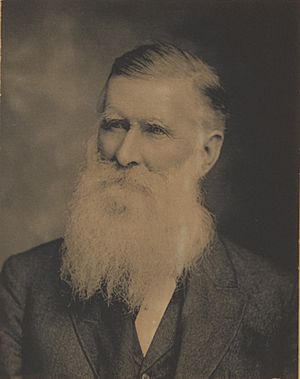Philip King (Australian politician) facts for kids
Quick facts for kids
Philip Gidley King
|
|
|---|---|

King in c. 1898
|
|
| Born | 31 October 1817 |
| Died | 5 August 1904 (aged 86) |
| Nationality | Australian |
| Occupation | Pastoralist |
| Years active | 1831–1904 |
| Known for | Voyage of the Beagle 1831-1836, Australian Agricultural Company, Australian politics |
Philip Gidley King (born October 31, 1817, died August 5, 1904) was an important person in early New South Wales. He was a pastoralist, which means he managed large farms with animals like sheep or cattle. He was also a politician, serving in the government of New South Wales.
Early Life and Adventures
Philip Gidley King was born on October 31, 1817, in Parramatta, New South Wales. His parents were Phillip Parker King and Harriet Lethbridge. His grandfather, also named Philip Gidley King, was a famous Governor of New South Wales a long time ago.
When Philip was young, he went to school in England. At just nine years old, he began an amazing adventure. He sailed with his father on a ship called HMS Adventure. They were exploring and mapping the coast of South America.
Sailing with Charles Darwin
In December 1831, Philip joined another famous ship, HMS Beagle. He was a midshipman, which is a junior officer. On this journey, he became good friends with Charles Darwin. Darwin was a famous scientist who developed the theory of evolution. Philip and Darwin stayed in touch for many years.
After his incredible voyage, Philip returned to Parramatta in January 1836. He then started working on large farms, called pastoral stations. These were located near the Murrumbidgee River and around Port Phillip.
In 1842, Philip took charge of horse and cattle farms at Stroud. These farms belonged to a big company called the Australian Agricultural Company. In 1843, he married Elizabeth Macarthur, and they had four children together. From 1854, King managed a property near Tamworth.
Becoming a Politician
Philip Gidley King was a leader in his community. From 1876 to 1880, he was the very first mayor of the town of Tamworth.
In 1880, a very important politician named Sir Henry Parkes chose Philip for a special role. Sir Henry Parkes was the Premier, like the head of the government. Philip was appointed to the New South Wales Legislative Council. This council was a part of the government that made laws. He was generally associated with the Free Trade Party, a political group at the time.
Later Years
In 1892, a publisher asked Philip to share his memories of sailing on the HMS Beagle. They wanted to add his stories to a new edition of Charles Darwin's famous book, The Voyage of the Beagle.
Philip's memories and an autobiography he wrote in 1894 are now kept at the State Library of New South Wales. Philip Gidley King passed away in Sydney on August 5, 1904, at Double Bay.
 | Sharif Bey |
 | Hale Woodruff |
 | Richmond Barthé |
 | Purvis Young |

